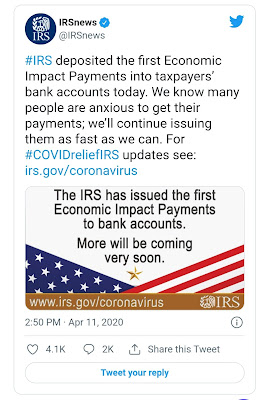Important Information about the First Coronavirus Stimulus Checks
 |
| U.S. Coronavirus Stimulus checks |
 |
| U.S. Coronavirus Stimulus checks |
 |
| Messenger verification text |
You may be wondering the following questions:
Why do I keep getting a text with a Messenger Verification code? Have I been hacked?
The obvious reason that you are receiving a messenger verification code is that someone is trying to log into an account that is linked to your cell number that requires 2-Factor authentification, and you have this feature turned on.
Wait. What is a Messenger verification code?
A Messenger verification code is a short numeric code, typically between 4 to 8 numbers sent to you via text, call or email by the website or app that you are trying to log into. Most of the time, you enabled this feature at some point for extra account security.
Every time they try to log into your account, even if they know your password, they must then enter the 2-Factor authentication code after that to successfully access your account.
When you receive a text message with a Messenger Verification code, it means that someone is actively trying to log in to your account with your password.
First, when you receive a text message with a Messenger Verification code, never reply or respond to the text. Sometimes, a "phisher" is trying to gain information, if it asks for a call to action. If a text message provides a number to call, never call that number.
Next, thing about all of your online accounts (i.e. Facebook, Google, Microsoft, etc.)
Can you think of any of your online accounts that you have 2-Factor authentification enabled?
This is the first place to start.
Consider changing the password on your accounts where this is enabled, and increase the complexity of your password. In today's world, you need all of your online accounts to have different passwords. You may need to use a secure password manager to store your different passwords.
If you cannot remember, which accounts have 2-Factor authentification enabled, it is a great practice to use this feature on all important accounts that you don't want to lose.
